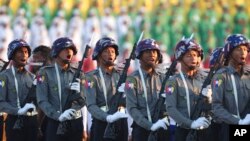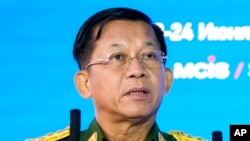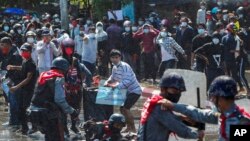As Indonesia assumes the rotating chair of the Association of Southeast Asian Nations for 2023, pressure is mounting on Jakarta to formalize an appropriate response to member Myanmar’s military – the Tatmadaw – which seized power from an elected government two years ago.
Analysts said the descent into civil war had effectively annulled a much-touted ASEAN peace plan, known as the five-point consensus, but added that it had paved the way for Indonesian President Joko Widido to take a new, much stronger line against Tatmadaw chief General Min Aung Hlaing.
Ross Milosevic, director of Phnom Penh-based Risk Analysis & Resources International, said Myanmar had sorely tested the remaining nine ASEAN countries and the group’s response, led by two of the association’s smaller members – Brunei and Cambodia – since the Feb. 1, 2021, coup, had fallen short of expectations.
“ASEAN has always had that noninterference landscape in their policy, but facts are facts, and this plan has been a disaster. I don’t think ASEAN has handled the situation in a correct way,” he said.
Charles Santiago, from the ASEAN Parliamentarians for Human Rights group, agreed, saying there had been no dialogue, as stressed under the consensus, and after two years the plan has “been dead for a long time, it’s over, it’s dead, it’s completely buried.”
Myanmar was banned from annual ASEAN summits when Brunei held the chair in 2021 and again by Cambodia last year.
But both countries failed to negotiate with the opposition National Unity Government, or NUG, or its armed People’s Defense Force, or PDF.
Phnom Penh even attempted to normalize relations between the Tatmadaw and ASEAN, which outraged many but ultimately failed amid atrocities that have claimed at least 2,700 lives. Another 13,600 people are under detention and more than 1 million civilians have been displaced.
Santiago said a decision by the junta to call “promised elections” possibly for August would prove farcical because laws governing the polls would make it impossible for the NUG and other political parties to compete. It would also risk cementing a stark divide inside ASEAN.
Within ASEAN, Santiago said Thailand, Cambodia and Laos would support any result legitimizing the military’s control of a civilian government while outside the bloc Myanmar’s ruling junta leader Min Aung Hlaing could also count on support from China, Russia and India.
“Indonesia should talk to Malaysia, to Singapore and possibly Philippines and if Brunei is on the same page, to say that this election cannot go on though because it will make a fool of ASEAN and ASEAN will look like a pariah region for all over the world,” he told VOA.
Vietnam was too difficult to read given the current leadership shakeup, he added.
Indonesia, by geography, population and economic clout is the ASEAN powerhouse. It is the world’s third-largest democracy, has solid ties with the West and is part of an Islamic troika within ASEAN, alongside Brunei and Malaysia.
Jakarta has begun laying the groundwork for its year at the ASEAN helm. Indonesian Coordinating Minister for Maritime Affairs and Investment Luhut Panjaitan told Bloomberg News on the sidelines of the recent World Economic Forum that the Tatmadaw should “let someone else who is qualified manage this country.”
At the same time, Indonesian Foreign Affairs Minister Retno Marsudi announced she will establish an office of ASEAN special envoy on Myanmar to engage with all parties involved.
That prompted a terse statement from the junta, warning ASEAN not to “engage with any terrorist groups and unlawful associations [recognized] by the Government of Myanmar.”
Analysts said Jakarta’s options could go much further and include handing the NUG Myanmar’s seat in ASEAN, freezing all ties with the junta, global sanctions on military-owned companies, and an absolute arms embargo.
That would include aviation fuel, a no-fly zone, designated safe zones for those fleeing the conflict, and the provision of humanitarian aid that failed to materialize under the five-point consensus.
“It [Indonesia] is an effective country in the sense of the economy and it has a high engagement with the rest of the world – and this will put an incredible amount of pressure on Myanmar and the Tatmadaw,” Milosevic told VOA, adding: “This is a civil war.”
A September briefing paper by the Special Advisory Council for Myanmar, a prodemocracy group of experts, claimed Min Aung Hlaing and the military do not have sufficient effective control of the country to warrant engagement with the outside world.
The paper applied international standards in determining which side in the conflict best meets the criteria used to establish control of a state and found the NUG and resistance groups had “effective control” over 52% of the country.
It found the Tatmadaw is being actively contested by the PDF and other resistance forces across 23% of Myanmar’s countryside and that the military can only claim to hold stable control over 17% of the country.
There are 135 distinct ethnic groups in Myanmar. Of them, 14 alliances make up the PDF, which Milosevic said were using hit-and-run, guerrilla-type tactics used by the Viet Cong during the Vietnam War and had pushed the conflict from the jungles to provincial towns.
“The PDF are taking the fight to the Tatmadaw and they’re winning on the ground but the Tatmadaw are using their airpower and making it very difficult for the PDF and the ethnic tribes and it’s going to get worse.
“The dry season has just started and the PDF, they are forcibly changing the whole strategy of the Tatmadaw – they’re being ambushed on a daily basis – and this is an effective way just like the Viet Cong did during the Vietnam War,” he said.
Santiago said Myanmar was expected to be the priority when Indonesia hosts a foreign ministers retreat on Feb. 3-4 amid “frank and open” discussions to be held behind closed doors to establish ASEAN’s foreign policy agenda for the year.
“The next meeting of the foreign ministers is going to be a very difficult one because the purpose of that meeting is supposed to iron out the mandate given to them by the heads of government in order to help facilitate the five-point consensus that was established two years ago.
“But I think recent developments have overtaken the need for such a discussion,” he said.






